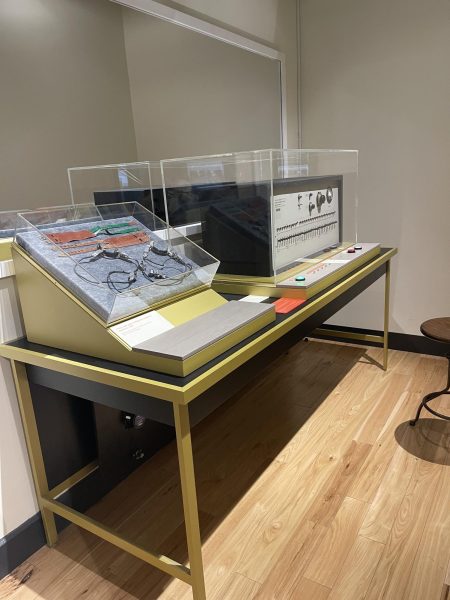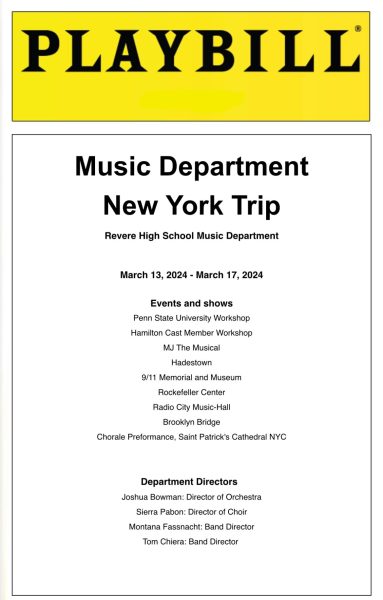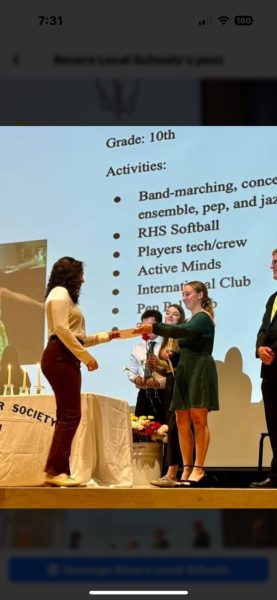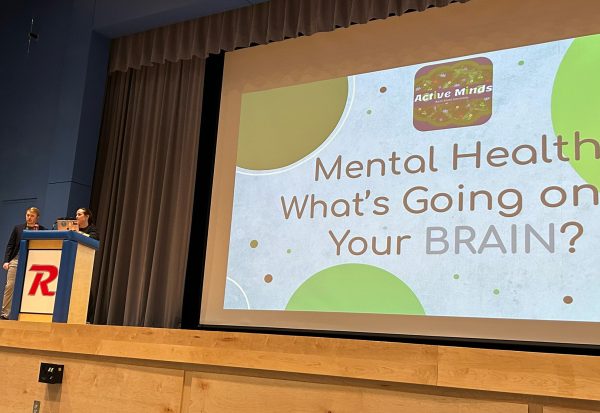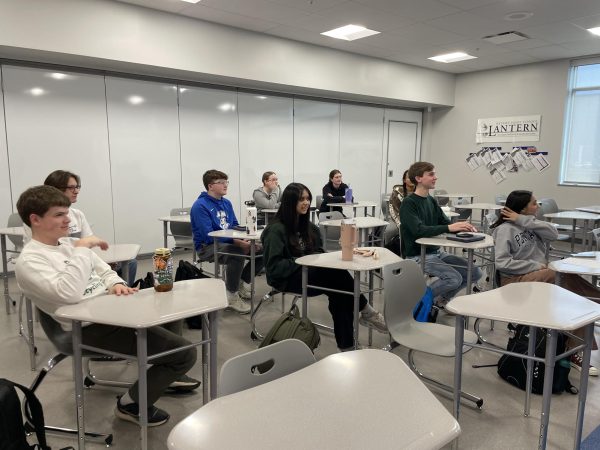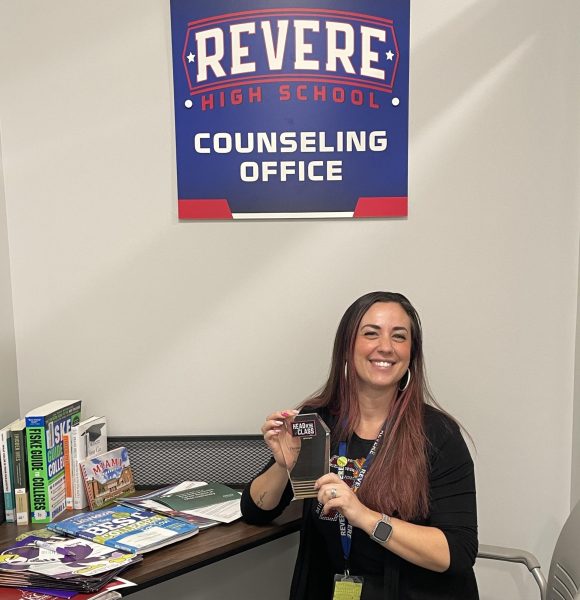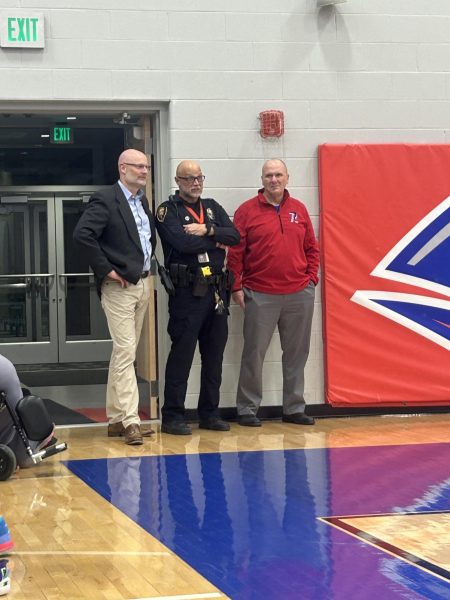Revere High School hosts heroin assembly
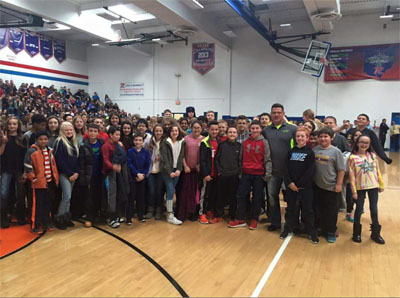
Photo courtesy of Travis Bornstein. Used with permission.
Travis Bornstein poses with students at his presentation at Revere High School on November 21.
In light of recent events, Travis Bornstein presented two lectures at Revere High School seeking to raise awareness about what continues to be the national epidemic of drug abuse.
Students grades six through twelve attended a mandatory presentation, entitled Breaking Barriers, on November 21 at 1:30 pm in the main gym of Revere High School. The second presentation took place on the same day from 7:00 pm to 8:00 pm and was open to any and all community members.
Bornstein’s messages centered around one child in particular, Tyler J Bornstein, his son.
Tyler grew up loving athletic endeavors of all breeds. Be it golf, rollerblading or swim, he thrived in any athletic setting. But, with any sport, comes injury.
Throughout his athletic career, Tyler broke his right arm four times and had two surgeries. At the age of eleven, Tyler had his first surgery—along with it came his first taste of prescribed opiate pain medicine.
Graduating Magna Cum Laude from Lake High School, Tyler earned a golf and academic scholarship from Walsh University. At eighteen, Tyler was again exposed to opiate pain medicine after his second surgery—this time on his elbow. He quickly became addicted and began substituting heroin instead.
About a year after his high school graduation, Tyler was clean again. The next couple of years Tyler would spend in and out of rehabilitation centers.
On September 28, 2014, Tyler met with another heroin addict and became very close to overdose status. Instead of calling 911, the individual who was with him, took him to a vacant lot and left him there. He was declared dead later that day.
Drug addict. The phrase alone alludes to a specific mental image: an inner city kid, perhaps brought up wrong. Bornstein debunked this stereotype quite quickly. His message was clear: Addiction is a problem everywhere.
“It starts very innocently—[whether it be] rich kids, poor kids [or] athletic kids,” Bornstein said.
Bornstein blamed the over-prescription of opiates as the main cause for the epidemic.
“Four out of every five heroin addicts start with opiate pain medicine . . . [A] kid goes to dentist to get his wisdom teeth pulled, and [the] dentist gives the kid something to get through the pain. What people do not understand, whether it be student . . . or parent, [is that] opiate addictions [started] innocently,” Bornstein stated.
Bonnie Simonelli, Revere’s At Risk Student Coordinator, played a critical role in inviting Bornstein to speak to the student body. She stated her desire to create a more education based environment when it comes to drug addiction.
“[Bornstein] talked to the kids at one of the Hudson schools, and one of our middle school counselors thought it would be good to have him come up here to [Revere] High School . . . I want to educate the students and not just sweep it under the rug,” Simonelli said.
Another crucial advocate included Revere High School principal Phil King. King shared his views, stating that the problem hides in the notion that suburban schools can easily become a dealer’s main target.
“Schools are a microcosm of society. It is a societal problem. It just so happens that schools are an easy target and people may claim that Revere has a problem. However, we have not had students exhibit signs of use at school. If there is ever an issue, we address it with that individual quickly and privately — not to keep our school out of the focus, but to keep the privacy rights of students,” King said.
Bornstein wants to put a normal face on the epidemic, as he continuously reinforced the idea that opiate addiction happens everywhere. Though the presentation was mandatory for all students, Bornstein posed a critical message for parents as well, and that message was clear: be aware. Bornstein elaborated.
“My message is my message. My story is my story. It is an educational story. I didn’t understand it as a parent. I had no idea that the medicine they were giving my son was addictive, so it is really all an educational process. Parents need to know to ask ten thousand questions when a doctor is giving their kids painkillers,” Bornstein said.
Bornstein is one of the founding members of Breaking Barriers – Hope is Alive, a nonprofit organization created in honor of Tyler. The organization works to change the stigma of drug addiction.
“Addiction is a disease, not a moral failure, and until we understand that, we are never going to come together,” Bornstein said.
Bornstein encourages all to look at the statistics, try to understand opiates and continue seeking education about both addiction and heroin use.
If you or a person you know is struggling with addiction of any sort, Mrs. Simonelli, located in the foreign language office, is always available to speak to any student confidentially about any personal issue or concern.

